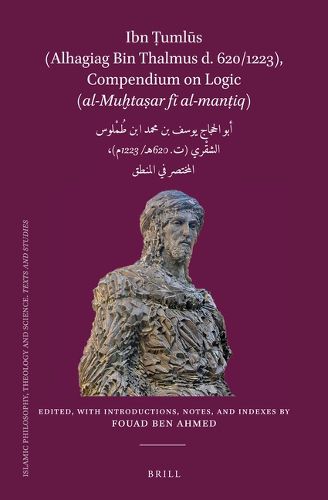Readings Newsletter
Become a Readings Member to make your shopping experience even easier.
Sign in or sign up for free!
You’re not far away from qualifying for FREE standard shipping within Australia
You’ve qualified for FREE standard shipping within Australia
The cart is loading…






Abu al-Hajjaj Yusuf b. Muhammad Ibn Tumlus (Alhagiag Bin Thalmus, d. 620/1223) was a philosopher, physician and direct disciple of Ibn Rushd (Averroes, d. 595/1198), who lived and practiced rational sciences in Alzira and Marrakesh, a quarter of a century after the demise of his teacher. Ibn Tumlus was not Ibn Rushd’s only student who engaged in work on logic, but one of dozens of disciples, suggesting that the supposed simultaneous death of the latter’s philosophy is grossly exaggerated . As a valuable window into the practice of logic in 13th century al-Andalus and the Maghreb, Ibn Tumlus’ Compendium on Logic (Al-Mukhtasar fi al-mantiq) covers all the parts of the expanded Organon , as it was known since al-Farabi (d. 339/951). The present volume offers a complete critical Arabic edition of this work, with an English and Arabic introduction, notes and indices.
$9.00 standard shipping within Australia
FREE standard shipping within Australia for orders over $100.00
Express & International shipping calculated at checkout
Abu al-Hajjaj Yusuf b. Muhammad Ibn Tumlus (Alhagiag Bin Thalmus, d. 620/1223) was a philosopher, physician and direct disciple of Ibn Rushd (Averroes, d. 595/1198), who lived and practiced rational sciences in Alzira and Marrakesh, a quarter of a century after the demise of his teacher. Ibn Tumlus was not Ibn Rushd’s only student who engaged in work on logic, but one of dozens of disciples, suggesting that the supposed simultaneous death of the latter’s philosophy is grossly exaggerated . As a valuable window into the practice of logic in 13th century al-Andalus and the Maghreb, Ibn Tumlus’ Compendium on Logic (Al-Mukhtasar fi al-mantiq) covers all the parts of the expanded Organon , as it was known since al-Farabi (d. 339/951). The present volume offers a complete critical Arabic edition of this work, with an English and Arabic introduction, notes and indices.